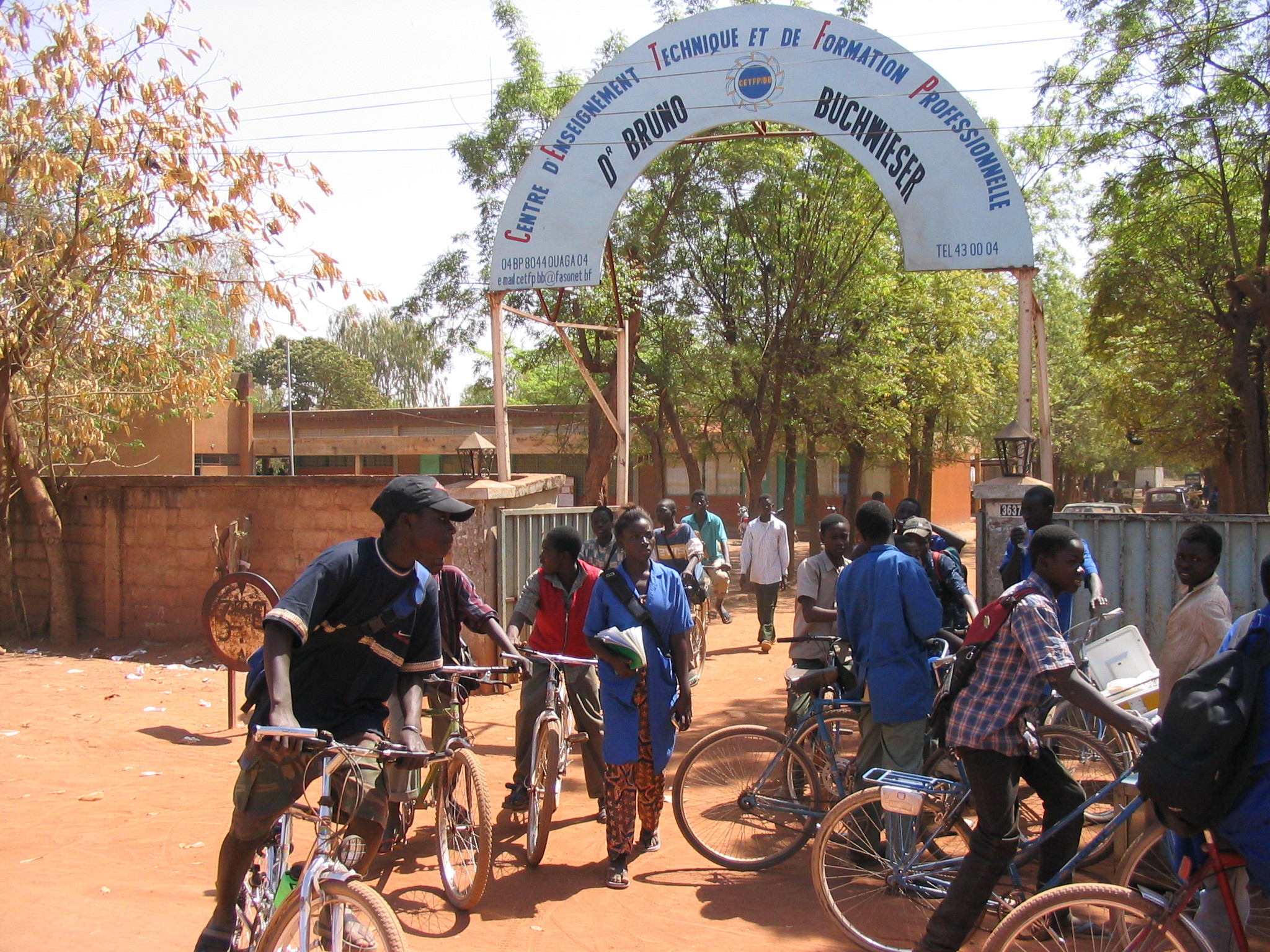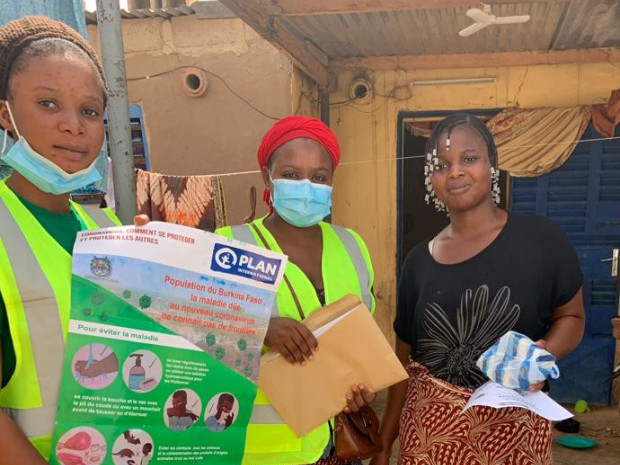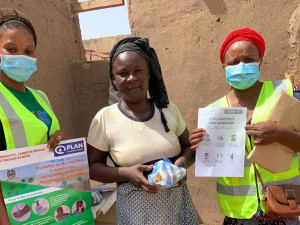Review
ÖJAB and Development Cooperation
On the following pages you find a selection of completed ÖJAB development cooperation projects from the recent past.
Water is life
In 2015 only around 54% of the population in Burkina Faso had access to clean drinking water. In rural regions like the community of Nanoro, the situation is even more drastic. Since water collection is often carried out by women and girls, they are disproportionately affected by the disadvantageous water supply. Due to the protracted search for water, girls are often not able to attend school or women are unable to pursue paid work.
The project was meeting these challenges by building a drinking water well in the community of Nanoro. The construction of two water connections gave the residents of the community as well as the pupils and teachers of a neighbouring school unlimited access to clean water. The maintenance and servicing of the well was arranged by a local partner organization with the help of the population. In addition, hygiene and health training courses were held in the community. These raised awareness for preventive health measures and the correct use of water as a resource.
Through the project "Water is life", the population of the community of Nanoro was supplied with clean drinking water. However, the social impact goes beyond the essential aspect of water supply. In future, girls will be able to pursue school education and women will be able to work in the local labour market, as the water supply is secured. Hygiene training for all user groups improved the general state of population's health.
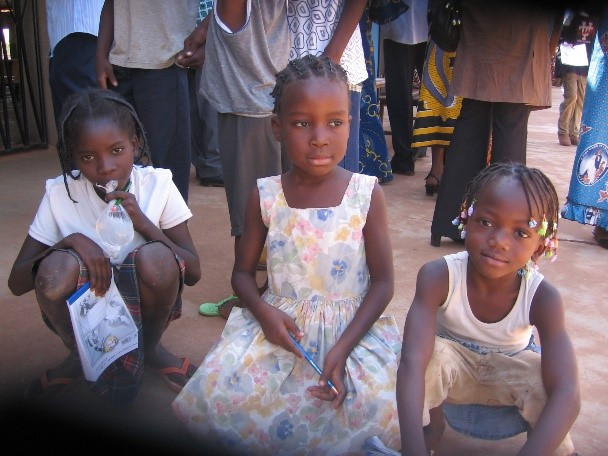
VIE-POSTIVE
Burkina Faso is one of the West African countries most affected by HIV. Thanks to improved medical care and educational work, the mortality rate and the rate of new infections have been significantly reduced. However, AIDS is still considered a taboo subject in many African countries. People infected with HIV are stigmatized and excluded from society.
Against this background ÖJAB enabled in cooperation with the local association "Vie positive" from 2006-2007 around 100 HIV-infected young people in Ougadougou to undergo apprenticeship training. "Vie positive" helped them to find an apprenticeship and granted the apprentices a monthly stipend for the period of one year. In addition, the young people received social support and were integrated into the community life of the association through educational and cultural events. The apprentices had free access to medical care, which is a special privilege in Burkina Faso.
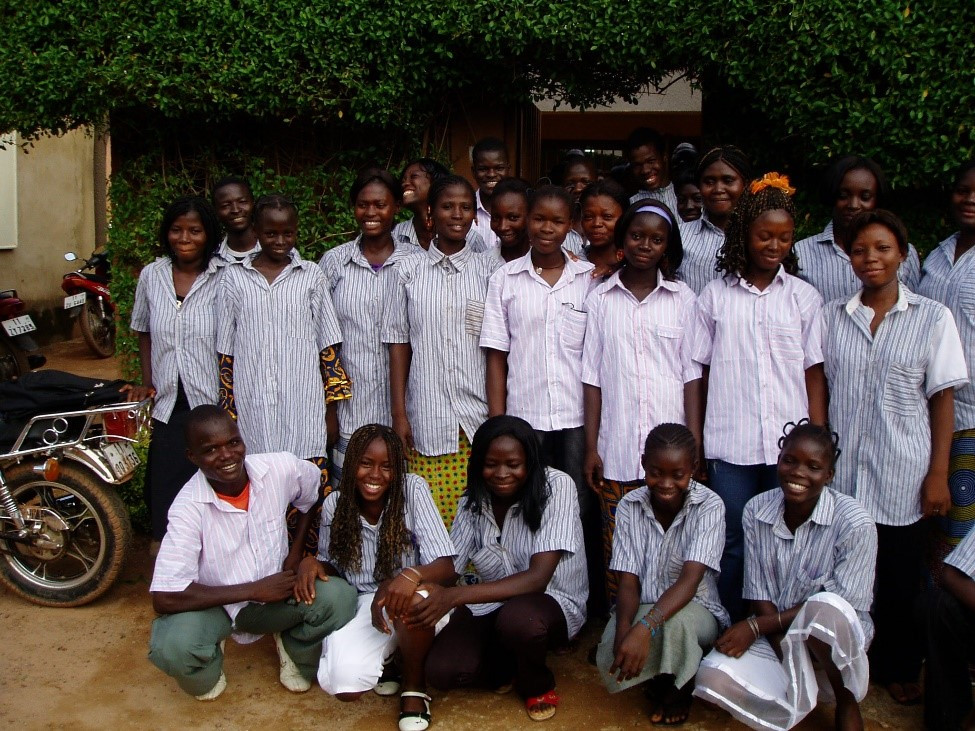
Den Kanu
"Den Kanu" means "love for the children" in the Dioula language. The orphanage "Den Kanu" is located in Bobo-Dioulasso (the second largest city of Burkina Faso). Approximately 36 children live in the orphanage and are cared for there on an ongoing basis.
In order to ensure the orphanage's power supply with clean energy, ÖJAB enabled the construction of a photovoltaic system in 2017. Burkina Faso has a very high solar radiation and this almost all year round. A photovoltaic (PV) system therefore represents the safest and most long-term solution for basic energy supply.
Specifically, the PV system in the orphanage serves as the main source of power for lamps and ventilators in the children's rooms and for the care staff, several refrigerators and freezers, and various appliances in the administration office.
In 2021 a project team of ÖJAB, together with the initiator of the project, Mr. DI Salia Konaté visited the orphanage in Bobo-Dioulasso. Even 4 years after construction, the PV system continued to function perfectly. Through the freezers, cooled water can be sold to businesses in the surrounding area, allowing the orphanage to cover part of its running expenses for childcare - a successful example of sustainable development cooperation.
The project was made possible with the kind support of the Cooperation Office of the Austrian Development Agency (ADA) in Ouagadougou.
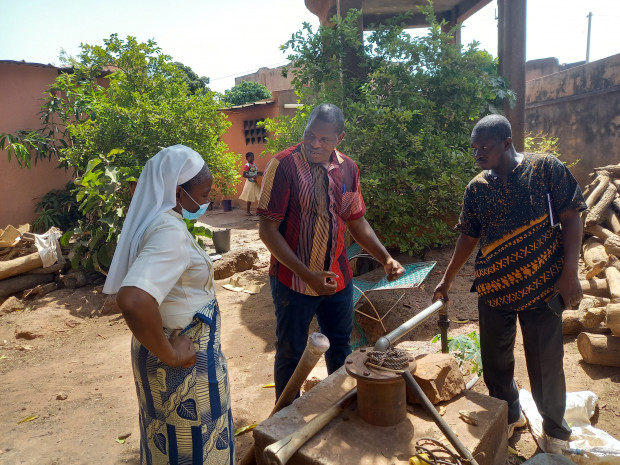
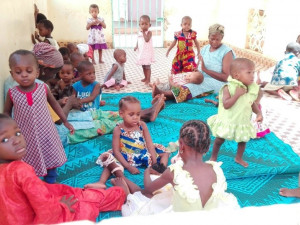
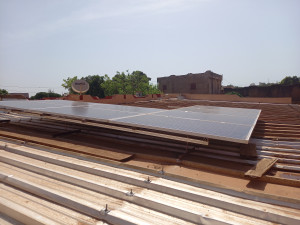
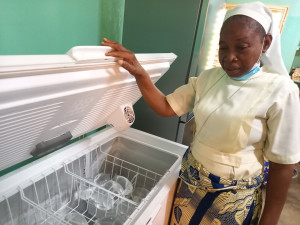
CORONA emergency aid in Burkina Faso
Measured by its population, Burkina Faso is disproportionately affected by the spread of the new corona virus in West Africa. The actual case numbers are likely to be many times higher than the official figures.
ÖJAB has been associated with Burkina Faso within the framework of development cooperation for many years. It was therefore particularly important to us to contribute to the containment of the spread of the virus in Burkina Faso.
Especially in densely populated areas in the capital Ouagadougou, especially in the so-called "non-loties", the risk of the corona virus spreading is high. The improvement of basic hygienic conditions is extremely important to prevent the virus from spreading.
In a first support action by ÖJAB, in 2020 3,000 soaps and protective masks were therefore distributed to families affected by poverty in suburban neighbourhoods of Ouagadougou. The families were also informed about the most important corona rules by our voluntary supporters:
- I wash my hands regularly.
- I bow without shaking hands.
- I keep a distance of 1.50 m to other people.
- I stay at home as often as possible.
- I avoid meetings, gatherings and ceremonies of any kind.
- I cough or sneeze in my elbows or in a disposable tissue.
- I wear a mask at the market and other unavoidable meeting places, but always keep my distance.
The soaps were bought locally in Burkina Faso and are a natural product. They were made from the fruit of the karité tree and produced by small entrepreneurs in Burkina Faso. In this way, not only was the hygiene of the population improved, but local small businesses are supported.
ONE GIRL - ONE PROFESSION
Vocational Training for Girls in Burkina Faso
Education is the most powerful tool to prevent the marginalisation and oppression of women. With the project "One girl - one profession", ÖJAB, together with the Bon Samaritain school, has set itself the task of counteracting this risk. The partners founded a centre for vocational training for girls (CFFP - Centre Féminin de Formation Professionnelle) where young women from difficult backgrounds have been learning the tailoring profession since 2010.
With the project "One Girl - One Profession", which is funded by the municipality of Vienna and runs for three years (2014 - 2017), the target group was extended to rural areas, where it is even more difficult than in the capital Ouagadougou to gain a foothold in educational measures or on the labour market.
In the course, 20 girls are trained as tailors, but are also taught basic questions of hygiene, health and family planning. They learn basic skills (arithmetic, writing, French, etc.), which they had partly lacked due to their lack of previous education. After completing the course, the young women are equipped with mechanical sewing machines by ÖJAB and are in contact with the school through a graduate association.
GIRLS IN OUAGADOUGOU - EDUCATION QUALIFIES
In order to be particularly committed to the target group of women, who often find it harder than their male colleagues to gain a foothold in the labour market, ÖJAB initiated a project entitled "Girls in Ouagadougou - Education Qualified".
The project was carried out together with the ÖJAB project partner, the Bon Samaritain primary school, in the period from 2010 to 2013. A Centre for Vocational Training for Girls (CFFP - Centre Féminin de Formation Professionnelle) was established on the school campus. In the three-year pilot course, 20 girls were trained as tailors, but were also taught basic questions of hygiene, health and family planning and learned basic skills (arithmetic, writing, French, etc.), which they had partly lacked due to their lack of previous education.
Since the pilot project had become well established and the corresponding infrastructure had been created on the school campus, subsequent years could be taken up for training as tailors.
Westsahara
Training of Kindergarten Teachers
ÖJAB carried out educational projects in Western Sahara from 1992 to 2009, most recently in the kindergarten sector:
The aim of the project was to support the Saharawi people in establishing a kindergarten education and practice.
The project included several training courses (apprenticeships), each of which was divided into three phases:
Phase 1 - Basic training: comprises a three-month German course followed by nine months of training at various educational institutions for kindergarten teachers in Austria
Phase 2 - Practice and application of the knowledge in refugee camps: a period of 18 months is calculated for this purpose, so that the graduates can gain sufficient experience with groups of children
Phase 3 - Follow-up training, pedagogical internship or specialisation (approx. 3 months): Those graduates (maximum 4 per course) who show commitment and motivation in their work are given the opportunity to further their education in a special field in Austria.
After completion of the 5th training course (39 kindergarten teachers), the focus was on the idea of anchoring essential training focal points such as kindergarten didactics and practice in the Sahrawi kindergarten. In order to achieve this, the training of trainers for kindergartens and the development of an adapted curriculum was carried out.
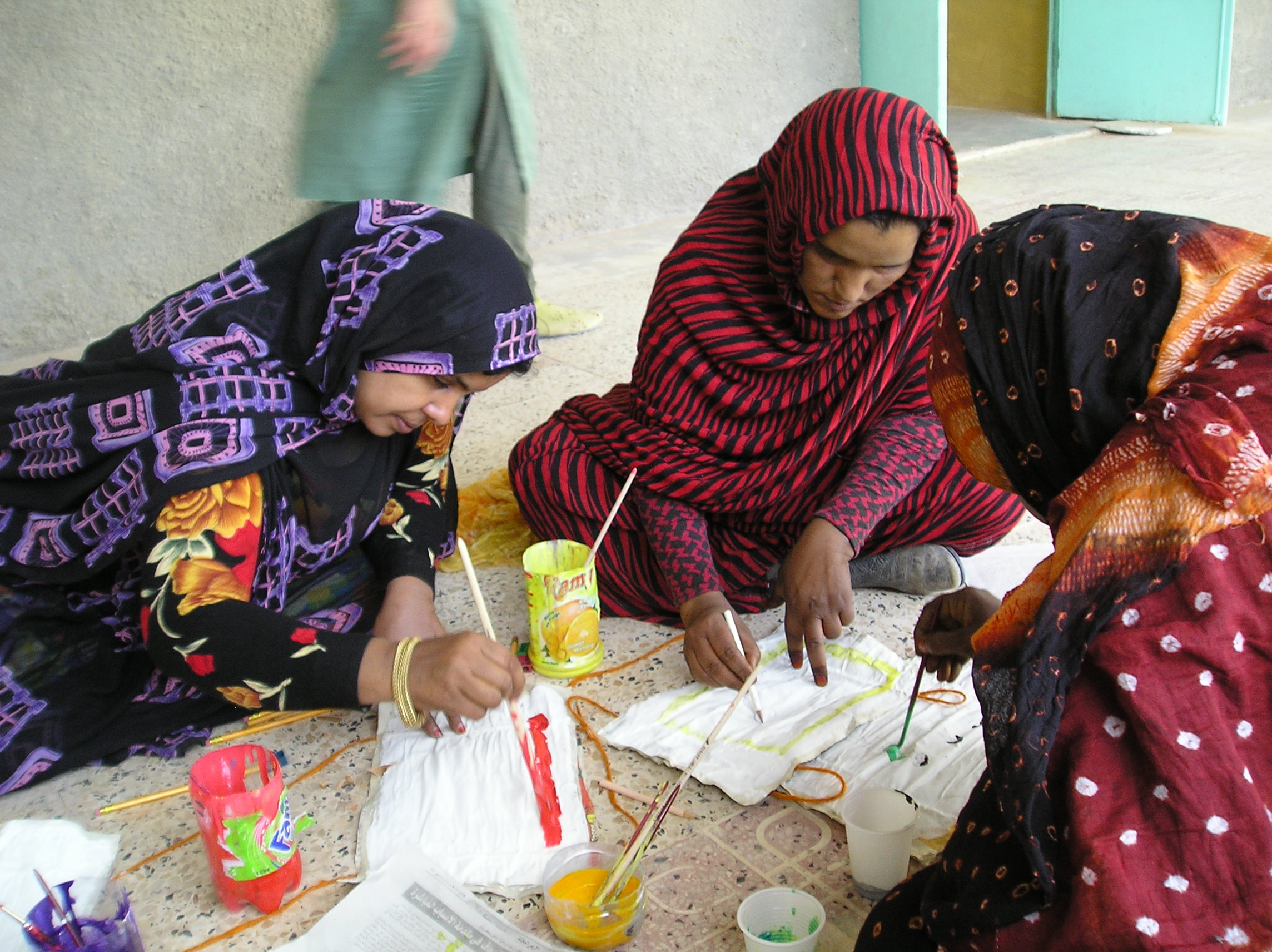
Dr. Bruno Buchwieser-School
In ÖJAB’s development cooperation projects, sustainability is of paramount importance. Projects initiated by ÖJAB are intended to be capable of running independently sooner or later. A major example of this is the Dr. Bruno Buchwieser School in Ouagadougou, the capital city of Burkina Faso.
In 1966, at the initiative of its then-president Dr. Bruno Buchwieser, ÖJAB sent four young workers—the electrical engineers Kurt Ganahl and Dittmar Zoger, builder Fritz Lehr, and construction foreman Hans Seidl—to Upper Volta, as Burkina Faso was then called. Their mission was to work together with regional helpers and construction companies to create a vocational school for technical and commercial occupations. It was at the beginning of the 1969/70 academic year that ÖJAB finally opened its “Centre Autrichien de Formation Téchnique et Professionnelle (CAFTP)”—a vocational school for mechanical engineering, electrical engineering, and electronics—for an initial, 60-student phase of operation. The number of students was soon raised to 260. Kurt Ganahl served (until 1974) as this school’s first principal and simultaneously as Austria’s honorary consul in Upper Volta. At that time, he was Austria’s only representative in the country.
For two decades, young people in Upper Volta talk advantage of a high-quality, five-year course of specialized training at ÖJAB’s CAFTP—and when Upper Volta was renamed Burkina Faso in 1984, the CAFTP was likewise given a new name: “Centre Austro-Burkinabè de Formation Technique et Professionnelle (CABFTP).”
In 1995, ÖJAB ultimately turned this successful school over to the Burkinabè state. Out of gratitude to its founder, the state subsequently renamed the school as the “Centre d'Énseignement Technique et de Formation Professionnelle – Dr. Bruno Buchwieser.”
Today, over 1,000 students attend this Burkinabe educational institution (now called the Lycée Professionnel Bruno Buchwieser) in order to train for careers in mechanical and electrical engineering, electronics, and the construction trades.
